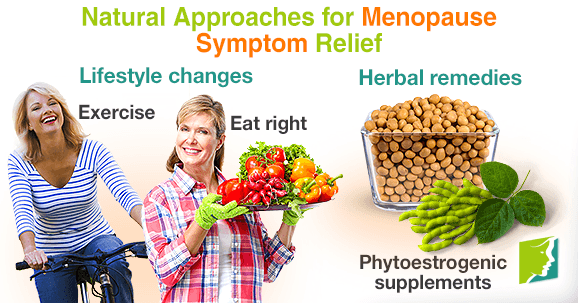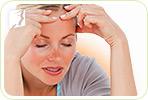Hormone fluctuations - specifically of estrogen and progesterone - are the main cause of menopause symptoms. Whether it is fatigue, weight gain, breast pain, vaginal dryness, or moodiness, changes in hormone levels are usually the culprit. The extended stage of gradually falling and fluctuating hormone levels is called perimenopause, which usually takes place in the years leading up to and around a woman's last period.
However, there are efficient ways to reduce and relieve menopause symptoms. Several lifestyle changes - like exercising regularly and maintaining a healthy diet - can help.
Lifestyle Changes
In addition to tackling menopause symptoms, lifestyle changes can increase your overall health and well-being.
Exercise regularly
Getting adequate exercise not only keeps you fit and healthy, but it has also been shown to prevent many menopause symptoms. It is generally recommended to get around 30 minutes of aerobic exercise at least five times a week. Yoga, walking, swimming, and biking are all excellent low-impact workouts that can reduce stress and boost energy levels.
Eat right
Maintaining a balanced and healthy diet is vital to feeling and looking your best. It is important to include plenty of protein, fruits and vegetables, and healthy fats into every meal. It is recommended to eat healthy meals three times a day, in addition to small, wholesome snacks every three to four hours. There is no superfood that can reduce menopause symptoms, but a healthy overall diet can definitely help.
Hydrate
Drinking plenty of water is crucial for your body to function properly. Staying properly hydrated as also been shown to reduce certain menopause symptoms like headaches, fatigue, and breast pain.
Sleep
Getting plenty of sleep is another fundamental factor in preventing menopause symptoms. Sleep allows the body to recharge, refresh, and strengthen its defenses against pain and illnesses. The average recommended amount of sleep is around eight hours.
Other Treatments
Herbal remedies are an alternative to prescription and over-the-counter medications. There are two types of herbal remedies and supplements that can help alleviate menopause symptoms caused by hormonal imbalances.
Phytoestrogenic supplements
These supplements contain estrogenic components, which treat hormonal imbalance by introducing compounds that act like estrogen into the body, leading to increased estrogen levels.
For example, soy has been a popular herb with menopausal women because it is known to help symptoms like hot flashes and hair loss due to its phytoestrogenic compounds. However, not all women find relief with phytoestrogens.
Hormone-regulating supplements
These supplements nourish a woman's endocrine system, which helps it produce the right amount of hormones. Hormone-regulating supplements can be considered a safe way to treat menopause symptoms.
Talk to your doctor if you have any questions or if your menopause symptoms are lowering your quality of life. Click on the following link for more information on treating menopause symptoms.
Sources
- Mayo Clinic Staff. (2015). Menopause. Retrieved December 15, 2015, from http://www.mayoclinic.org/diseases-conditions/menopause/basics/definition/con-20019726
- National Center for Complementary and Alternative Medicine. (2012). Menopausal Symptoms and Complementary Health Practices. Retrieved July 24, 2014, from http://nccam.nih.gov/health/menopause/menopausesymptoms
- Office on Women's Health. (2010). Menopause. Retrieved July 24, 2014, from http://womenshealth.gov/menopause/symptom-relief-treatment/natural-alternative-treatments-lifestyle-changes.html
- National Health Service UK. (2015). Menopause. Retrieved December 15, 2015, from http://www.nhs.uk/conditions/menopause/pages/introduction.aspx
- University of Maryland Medical Center. (2013). Menopause. Retrieved December 15, 2015, from http://umm.edu/health/medical/reports/articles/menopause




